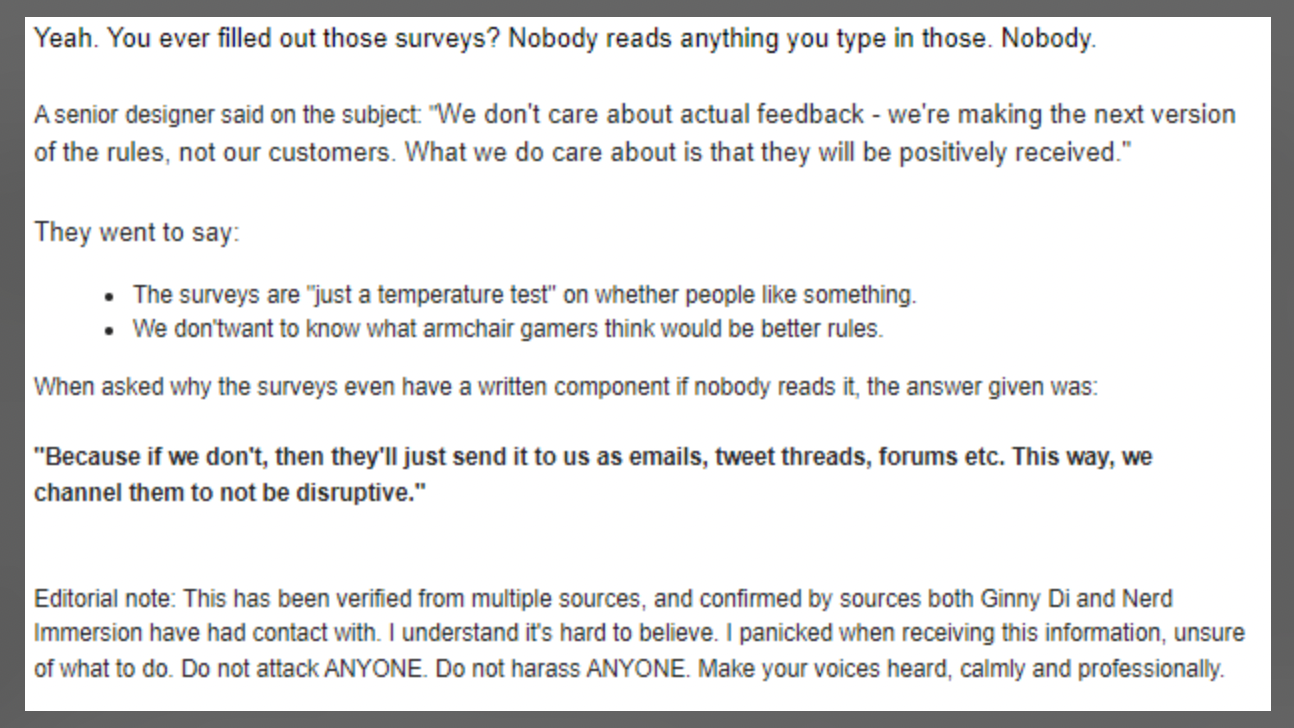Dungeons & Dragons Pushes Back on One D&D Survey, D&D Beyond Rumors

Current and former Dungeons & Dragons design team members spoke out alongside the official D&D Beyond account to push back on a number of rumors involving the future of D&D Beyond and how the One D&D surveys are conducted. Yesterday, the DnD_Shorts Twitter account shared a paraphrased email from an alleged Wizards of the Coast staffer who claimed that the D&D design team did not read the feedback sections in surveys. The emails even included a supposed quote from a senior designer who said that they they don't care about feedback and proceeded to disparage the customer feedback. You can see a screenshot of the email (DnD_Shorts' tweet has since been deleted) down below:

Several current and ex-D&D design team members quickly responded to the rumor, claiming that the surveys were in fact read by the D&D design team. Former Wizards of the Coast employee Taymoor Rehman noted that he had read over a half-million Unearthed Arcana survey comments during his first year on the team, while former D&D design team lead Ray Winninger stated that he personally read survey feedback and that One D&D's design schedule was built around how and when Wizards could collect feedback. Additionally, current Wizards of the Coast employee Mackenzie De Armas provided a detailed breakdown of how the survey playtest feedback is collated and used by the designers.
Hi, actual #WotCStaff and D&D Designer here. I am credited on several UA releases--and I've made edits to that content based on both qualitative and quantitative survey results.
-- Makenzie De Armas ? (@MakenzieLaneDA) January 18, 2023
Let's walk through what happens behind the scenes of a UA, shall we? ? https://t.co/ZY8DihQGcf
DnD Shorts later retracted their comments about the One D&D Survey and posted a follow-up email in which their source walked back several of their claims.
I have been in contact with the primary source I used for the survey feedback. Here you'll see my email, and their response (fed through a syntax paraphraser).
-- DnD_Shorts (@DnD_Shorts) January 19, 2023
I will continue to share all I have. Tomorrow you'll have everything I've recieved. Then I'm done. pic.twitter.com/GUQyTfDOBe
At the same time, the D&D Beyond Twitter account pushed back on several additional rumors about supposed changes coming the digital platform sometime in the future. This rumor, which appears to have first been posted by DragonScribe and then confirmed by several other well-known YouTube and Twitter D&D personalities, claimed that D&D Beyond was preparing to introduce a $30/month subscription tier, limit homebrew content for lower tier, and introduce AI DMs. DnD_Shorts specifically claimed that these initiatives were being led by Wizards of the Coast VP Chris Cao. In a series of tweets, the D&D Beyond specifically pushed back on each aspect of this rumor, stating that rumors of a $30/month subscription tier was false, that no one at Wizards of the Coast was working on an AI DM system, and that homebrew content will continue to be freely accessible on D&D Beyond.
{replyCount}commentsThe discourse follows a busy two weeks for Dungeons & Dragons as they attempt to rebuild trust following a disastrous attempt to release a new Open Gaming License, which would have had disastrous effects on the tabletop roleplaying game industry. While Wizards of the Coast issued a formal apology about their approach to the OGL yesterday, it appears they are still planning to +de-authorize" previous versions of the OGL to prevent new content from being published under those versions, which many have said is against the spirit of the OGL and is contradictory to what Wizards has said regarding the OGL in the past. The botched OGL rollout and subsequent slow response led to a rapid degradation of trust between the company and fans, which helps explain why additional rumors seem to be taking root so quickly in the discourse.
* This article was originally published here
Comments
Post a Comment